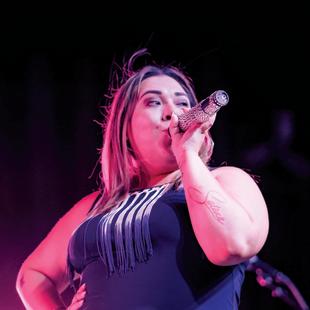History
Austin has a long history of Tejano and Latin culture that can be traced back to before the early 1920s to musicians such as master acordeonista and Conjunto Hall of Famer Camilo Cantú. Inspired by conjuntos before him like Leopoldo Guajardo, he began playing the accordion at dance parties in Central Texas. At the time, because of the lack of dance halls in rural areas, most of these parties were held at private residences. A young Johnny Degollado, who now is a longstanding local figurehead in conjunto music, attended these events with his family and observed the large crowds that Cantú’s music would draw.
In the 1940s and ‘50s, Cantú’s band frequented a former Del Valle dance club called La Polkita, but while he became known as “El Azote de Austin” (“the Scourge of Austin”) and a live music legend, his music was unfortunately never recorded. Luckily, future generations of Tejano musicians in Austin, such as Johnny Degollado, kept Cantú’s legacy alive. In addition to Degollado, the Tejano scene has grown into a community of unparalleled talent that includes those like Chencho Flores, Leonard Davila, Ruben Ramos, and many others.
Another pioneer of Tejano music and East Austin fixture, Manuel "Cowboy" Donley, often credited as the “Godfather of Tejano Music,” was instrumental in creating the orquesta sound by combining Mexican and American pop music elements inspired by big band. Inspired by his father who was also a musician and professor of orquesta, Donley’s music career caught fire in the 1940s and he is often credited for elevating Austin’s Latin music scene to the level of worldwide acclaim. He was inducted into the Tejano Music Hall of Fame in 1986, has recorded over 150 singles, and has received many prestigious awards (such as the National Endowment for the Arts) both on a national and local level.
Of course, while there is an endless list of names of important figures in Austin Tejano music history, those who are interested in learning more are welcome to visit the nearly 5-mile Tejano Walking Trail or Texas Music Museum, both located in East Austin, to discover more about legends in Tejano culture such as Cowboy Donley, Nash Hernandez, the Perez & Ramos families, and Matias Velasquez.
As decades have passed, the Tejano genre of music has become a cultural niche but nonetheless is carried on by those like Los Texas Wranglers, Los Pinkys, and Los A-T Boyz. Nowadays, local fans of Tejano music can enjoy the classic sounds of Pure Tejano Radio, a 24/7 internet radio station music operating out of Southeast Austin. Visitors may also plan their trip around events such as the annual Rancho Alegre Conjunto Music Festival. Additionally, for over a decade, the Leonard Davila-founded Austin Tejano Music Coalition and Austin Latino Music Association (ALMA) have been supporting the genre, expanding its community, and preserving the historical contributions of Tejano and Latin music.
The city’s Latin community is expansive and has only grown through the years. Those such as Patricia Vonne, Tish Hinojosa, and Rosie Flores led the charge to include more women in Latin music. Furthermore, there are a number of local musicians and bands of the younger generation that have been inspired by their Latin roots such as funk-brass band Cilantro Boombox, Latin funk orchestra Grupo Fantasma, contemporary cumbia-synth band Como Las Movies, Austin’s premiere Selena-tribute band Bidi Bidi Banda, multi-award winning female trio Tiarra Girls, Latin songstress Lesly Reynaga, and Brazilian multi-instrumentalist Paula Maya.
Venues for Tejano & Latin Music
In the South Congress area, music from the lively outdoor cantina of one of Austin’s most iconic local restaurants, Gueros’s Oak Garden, can be heard by passers-by every day Wednesday through Sunday. A hotspot for entertainment, Guero’s often hosts Latin bands such as 70s-inspired rock band Buenos Diaz, jam band El Tule, and funk band Ex Romantika. While you’re waiting for a seat to enjoy their authentic tacos al pastor, you can hang out under the shade and order refreshments from their outdoor bar.
Since opening in 2006, local non-profit Esquina Tango offers dance, exercise, and language classes open to all and free for seniors and children. The organization keeps East Austin busy by hosting social events, movies, salsa nights, flamenco shows, and live music on the regular. Whether it’s by yourself or with a partner, you can learn how to dance, take a yoga class, or enjoy music by local talents such as Susanna Sharpe’s Brazilian Quartet, Diana Naranjo, and Ana Barajas.
Of the largest of these venues is the Coliseum Austin (El Coliseo Austin). Located in Southeast Austin, the space is unlike any other in the city. It includes an enormous dance floor, five bars, and plentiful seating throughout the club. Celebrated guest performers of the Coliseum’s stage have been touring acts like salsa heavyweight Oscar DeLeon, American Idol winner Fantasia, and reggaeton artist Don Omar. Weekends at the Coliseum are filled with excitement and music by some of the best local DJs and musicians in town.
One of the city’s last remaining music venues that features original music on “Dirty Sixth” is Flamingo Cantina which opened in 1991 and has since remained one of the best venues for Latin, world beat, reggae and ska music.
Sahara Lounge, deep in East Austin, was founded in 2011 but had been the location of many venues before it such as the historic jazz and blues venue TC’s Lounge which was open for 33 years before the Sahara took over. The venue is run by local world music royalty, a mother-son team made up of Eileen Bristol of Zoumountchi, the “Africa Night” house band at the Sahara, and her son Topaz McGarrigle of psychedelic afrobeat collective Golden Dawn Arkestra, an Austin staple.
More Essential Musicians

If you’re headed into Austin and want to check out the city’s vast collection of world-renowned Latin acts (besides the ones mentioned above), you may already be familiar with the works of globally-recognized, Latin Grammy-nominated Gina Chavez, Chicano blues band Tito & Tarantula, resident rock band of brotherly love Vallejo, rock violinist Haydn Vitera, and Grammy-winning Los Lonely Boys whose hit debut single “Heaven” was a number-one hit on the Billboard adult contemporary chart and reached the Top 40 Billboard chart in 2004.
Contributed by Nathalie Phan.
From services such as HAAM and SIMs foundation to the city music/arts department to the venues, crew, and infrastructure on the ground, the sense of camaraderie and genuine investment in our shared experiences is priceless and worthy of nurturing.
